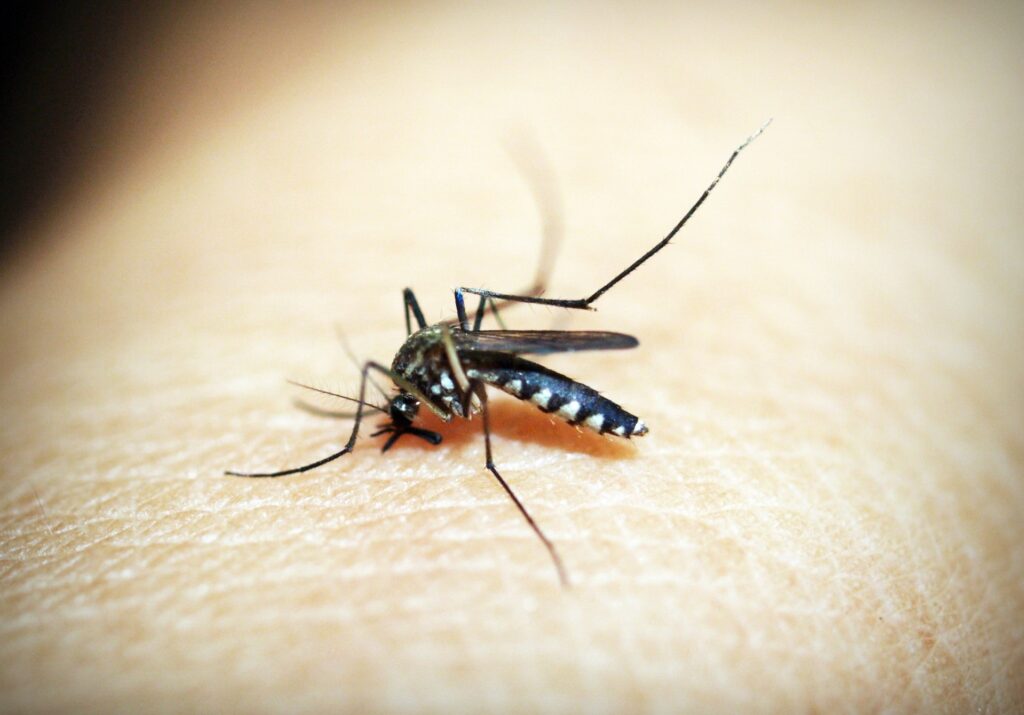Traveling soon? Looking for general tips on how to prevent malaria when traveling?
You’re not alone – most travelers have their worries too.
In this article, we’ll discuss the top 4 ways to avoid contraction:
- 1) Use insect repellent
- 2) Stay in screened / air-conditioned areas
- 3) Wear full-length clothing
- 4) Talk to a doctor about malaria prevention meds
Let’s dive into each one.
1) Use insect repellent to help prevent malaria
EPA-registered insect repellents can deter mosquitoes and other biting insects – thereby reducing your exposure to malaria.
Apply the repellent on exposed skin and clothing, as mosquitoes can bite through thin fabric. Remember to follow the product instructions for optimal protection.
However, while insect repellents can significantly reduce the chances of being bitten, they are not 100% foolproof. They should be combined with more preventive measures for optimal protection against malaria.
2) Stay in screened / air-conditioned areas
This method creates a physical barrier between you and the mosquitoes that transmit malaria.
Mosquitoes, particularly those that carry the malaria parasite, are most active during dusk and dawn. By staying indoors during these times, you can significantly reduce your exposure to these insects.
When choosing accommodation, opt for hotels or lodgings with screened windows and doors.
Air-conditioned rooms can also help deter mosquitoes. These insects prefer warm and humid environments, which are typical in tropical regions where malaria is common. By lowering the temperature and reducing the humidity with air conditioning, you can make your immediate environment less attractive to mosquitoes.
Here are some general tips for staying in screened or air-conditioned areas:
- Ensure all windows and doors are properly sealed: Check for any gaps or holes where mosquitoes could potentially enter and seal them.
- Keep doors and windows closed: Especially during peak mosquito activity times (dusk and dawn).
- If possible, use insecticide-treated bed nets: Even in screened and air-conditioned rooms, this can help create an extra layer of protection while you sleep.
- Avoid leaving standing water inside: Mosquitoes breed in standing water. Regularly check places like flowerpots, buckets, and vases, and empty them to prevent mosquito breeding.
3) Wear full-length clothing to avoid malaria
By full-length clothing, this means covering as much skin as possible with your attire.
Opt for long-sleeved shirts and long pants, especially during dusk and dawn when mosquitoes are most active. The less skin you expose, the fewer opportunities mosquitoes have to bite you.
Light-colored clothing is also recommended as it attracts fewer mosquitoes compared to dark colors.
But the tricky part:
Many doctors agree insect repellent and full-length clothing isn’t enough. This is why many travelers still contract malaria.
4) Malaria prevention meds
Prevention meds (like Malarone) kill parasites during the development stage, and doctors typically recommend you start taking them before you enter high-risk areas.
For most travelers, side effects are typically mild or non-existent (according to the Mayo Clinic) – one of the many reasons Malarone is highly sought-after.
However, a few problems often arise:
- Long clinic delays
- Pharmacy “stockouts”
- Unexpected price hikes
Many travelers can’t even locate a travel clinic either – due to limited access.
Here are 4 ways travelers can avoid this:
1. Use An Online Telehealth Provider
This allows you to “skip the line” and connect with a doctor from anywhere – for a consultation on your own time & schedule.
No need to go anywhere, you can do it right from home.
Plus, you don’t have to search around for a doctor. That’s the beauty of remote telehealth.
2. Have Meds Shipped Directly to You
When prescribed – a telehealth company will ship malaria medication to your doorstep.
There’s no risk of stockouts or unavailability.
Travelers love this, because it removes that pesky “doubt & uncertainty” in the back of your mind – wondering if you’ll get the meds you need.
It’s 2023, you shouldn’t have to worry about that.
The downside – you need to do this further in-advance, before you leave.
We recommend an online consultation at least 1 week before you depart.
3. Unlimited Chat-Based Care w/ A Doctor
Certain telehealth companies (like Runway Health) provide access to a doctor after your meds arrive too.
Have any questions? Not sure about something?
A physician is available to chat with remotely – before, during, and after your travels.
Travel clinics & primary care simply don’t offer this.
4. See Pricing Upfront (No Surprise Costs)
With travel clinics & primary care… pricing is often uncertain.
This especially frustrates travelers – once they’re hit with a shockingly-high bill.
It’s another reason to use a telehealth provider – you get 100% transparent pricing. The exact cost beforehand.
And since it’s done remotely, the prices are often lower – typically around $30-50 for a consultation.

